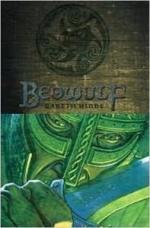What Gummere[1] calls the “rime-giver” has been studiously kept; viz., the first accented syllable in the second half-verse always carries the alliteration; and the last accented syllable alliterates only sporadically. Alternate alliteration is occasionally used as in the original. (See 7_61, 8_5.)
No two accented syllables have been brought together, except occasionally after a caesural pause. (See 2_19 and 12_1.) Or, scientifically speaking, Sievers’s C type has been avoided as not consonant with the plan of translation. Several of his types, however, constantly occur; e.g. A and a variant (/ x | / x) (/ x x | / x); B and a variant (x / | x / ) (x x / | x / ); a variant of D (/ x | / x x); E (/ x x | / ). Anacrusis gives further variety to the types used in the translation.
The parallelisms of the original have been faithfully preserved. (E.g., 1_16 and 1_17: “Lord” and “Wielder of Glory”; 1_30, 1_31, 1_32; 2_12 and 2_13; 2_27 and 2_28; 3_5 and 3_6.) Occasionally, some loss has been sustained; but, on the other hand, a gain has here and there been made.
The effort has been made to give a decided flavor of archaism to the translation. All words not in keeping with the spirit of the poem have been avoided. Again, though many archaic words have been used, there are none, it is believed, which are not found in standard modern poetry.
[ix]
With these preliminary remarks, it will not be amiss to give an outline of the story of the poem.
THE STORY.
Hrothgar, king of the Danes, or Scyldings, builds a great mead-hall, or palace, in which he hopes to feast his liegemen and to give them presents. The joy of king and retainers is, however, of short duration. Grendel, the monster, is seized with hateful jealousy. He cannot brook the sounds of joyance that reach him down in his fen-dwelling near the hall. Oft and anon he goes to the joyous building, bent on direful mischief. Thane after thane is ruthlessly carried off and devoured, while no one is found strong enough and bold enough to cope with the monster. For twelve years he persecutes Hrothgar and his vassals.
Over sea, a day’s voyage off, Beowulf, of the Geats, nephew of Higelac, king of the Geats, hears of Grendel’s doings and of Hrothgar’s misery. He resolves to crush the fell monster and relieve the aged king. With fourteen chosen companions, he sets sail for Dane-land. Reaching that country, he soon persuades Hrothgar of his ability to help him. The hours that elapse before night are spent in beer-drinking and conversation. When Hrothgar’s bedtime comes he leaves the hall in charge of Beowulf, telling him that never before has he given to another the absolute wardship of his palace. All retire to rest, Beowulf, as it were, sleeping upon his arms.
Grendel comes, the great march-stepper, bearing God’s anger. He seizes and kills one of the sleeping warriors. Then he advances towards Beowulf. A fierce and desperate hand-to-hand struggle ensues. No arms are used, both combatants trusting to strength and hand-grip. Beowulf tears Grendel’s shoulder from its socket, and the monster retreats to his den, howling and yelling with agony and fury. The wound is fatal.




